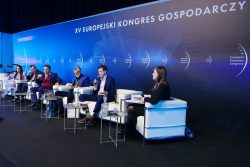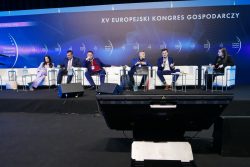New Technology Division of the Institute of National Remembrance at the 15th European Economic Congress
The 15th European Economic Congress (EEC), held in Katowice on 25–26 April, is one of the most important business meetings in Central and Eastern Europe discussing key trends and tendencies that are changing the economy and shaping its prospects in the fluctuating geopolitical and macroeconomic environment.
Director of the New Technology Division Magdalena Hajduk took part in the session “AI w Polsce: nauka, gospodarka, wsparcie” (“AI in Poland: Science, Economy, Support”). The panel also featured: Alexander Sharmazanashvili from the Georgian Centre for Molecular Engineering and Georgian Technical University, Michał Kanownik – President of the Management Board, Digital Poland Association, Mario Ottigliopresident, Global Coalition on Aging, Prof. Andrzej Zybertowicz – Social Advisor to the President of the Republic of Poland, Dawid Lasek – Vice President of the Management Board, Association of the Carpathian Euroregion Poland, Adam Zych – President of the Management Board, Polska PL Foundation. The discussion was moderated by Kinga Pasternak, Deputy Director of the GovTech Polska Programme, Chancellery of the Prime Minister.
The discussion was intended to present activities related to new technologies and to reflect on the new opportunities and potential risks arising from the development of technologies based on artificial intelligence. The panellists attempted to assess the impact of artificial intelligence on the social and economic system. Adam Zych pointed to an emerging consensus on the need to regulate how artificial intelligence functions, stemming from concern for human well-being in its proper sense. He noted that the rise of new technologies has not been accompanied by improvements in productivity. Most of the panellists agreed with the view that it is necessary to recognise emerging risks and consider introducing regulatory measures.
The temperature of the discussion was significantly raised by a statement by Professor Andrzej Zybertowicz, who in an alarming tone warned of the total threat to humanity posed by the development of artificial intelligence. The source of this threat, he believes, is the glaring disparity between the rate of AI advancement, which has accelerated by leaps and bounds in recent years, and our ability to control and adapt new technologies to human needs, human limitations and in terms of our security. Prof. Zybertowicz’s emphatic assessment was that “the digital revolution in its entirety has intensified the problems of humankind, destabilised geopolitics, destabilised democracy, and destabilised the sense of collective order.” In conclusion: it has brought more confusion than benefit.
Most of the panellists disagreed with Prof. Zybertowicz’s assessment, speaking primarily about economic and business benefits and taking an optimistic view of the future from a liberal perspective. Magdalena Hajduk from the New Technology Division of the Institute of National Remembrance presented an intermediate position, who, on the one hand, did not underestimate the seriousness of the threats, mentioning behavioural surveillance among them, but, on the other hand, pointing to the possibility of using AI for educational activities, the perception of history and the transmission of a unique cultural code to new generations. The Institute of National Remembrance can already boast new projects using new technologies, the effectiveness of which certainly looks highly promising. Director Hajduk reminded the audience that the New Technology Division of the Institute of National Remembrance was launched to initiate a dialogue with the younger generation and to implement new technologies in the teaching of history. In carrying out this task, the most important issue is to balance the expectations of young people with the educational mission. When asked whether AI helps to communicate historical truth, Director Hajduk replied, “An algorithm that only tells the truth is a tremendous challenge. I imagine that this can be achieved in the Institute of National Remembrance based on petabytes of verified data, but we must remember that, in the end, it should be up to people to decide what that truth is.”
Despite their differences, the panellists agreed that artificial intelligence is perceived in two different ways. On the one hand, it is welcome because it makes work easier; on the other hand, it arouses fears of replacing humans. They acknowledged the need to educate the public to raise awareness and encourage reliance on proven sources of knowledge. They also pointed to the need for institutional cooperation to develop sound regulations needed for the responsible and safe use of AI.
View the video recording of the session:






